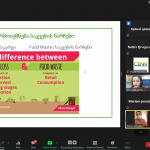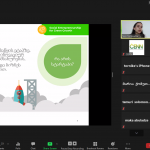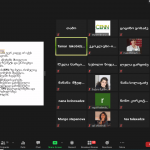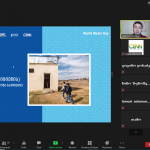On April 13-26, CENN together with EMBRACE Tsalka and GEO-CAP projects hosted up to 250 participants as part of the online environmental awareness raising social evenings to join a global campaign and celebrate Earth Day.
Earth Day is one of the largest environmental days, celebrated annually on April 22 around the world to demonstrate support for the environment.
On 13-26 April, 2021 within the frames of our cycle of online environmental social evenings as CENN’s experts came together to make clear that climate action and restoration cannot wait. Cycle of online social evenings focused on natural processes, emerging green technologies, green entrepreneurship and innovative thinking that can restore the world’s ecosystems.
The cycle of 7 social evenings encompassed goals and actions including reforestation, climate-smart agriculture, sustainable food and waste management, climate literacy, SDGs 2030 and citizen engagement.
From capturing carbon and supporting the health and resilience of communities, to advocating for compulsory, assessed climate education, we have the ability to make lasting changes.
It’s time for collaborative climate action in Georgia – Let’s act together!
The EU-supported ENPARD project “Embrace Tsalka” is implemented by CENN in partnership with the Georgian Farmers’ Association (GFA) and German partner organization – Institute for Rural Development Research (IfLS). The project aims at diversifying local economic activities, improving the investment climate, and empowering competitive agricultural and environmental practices in Tsalka Municipality via bottom-up strategic planning of rural development.
The European Union supported Georgia Climate Action Program (GEO-CAP) is implemented by CENN together with the Kakheti Regional Development Fund (KRDF), the Chiatura Union (ACU), the Racha-Lechkhumi and Kvemo Svaneti Agrotourism Development Association (RLS-ADA), and the Young Pedagogue’s Union (YPU). The target municipalities of the project are Gurjaani, Sagarejo, Akhmeta, Zestaponi, Tkibuli, Chiatura, Lanchkhuti, Ozurgeti, Oni, and Ambrolauri. The total budget of the project is 1 million euros.






